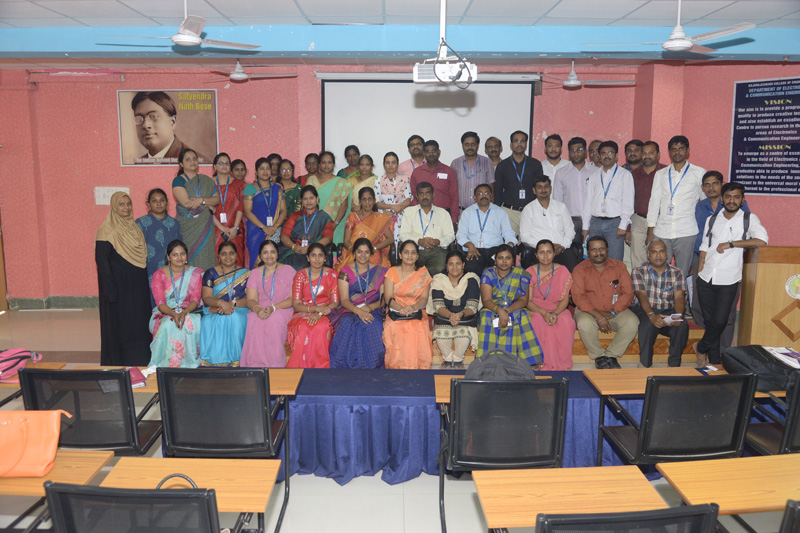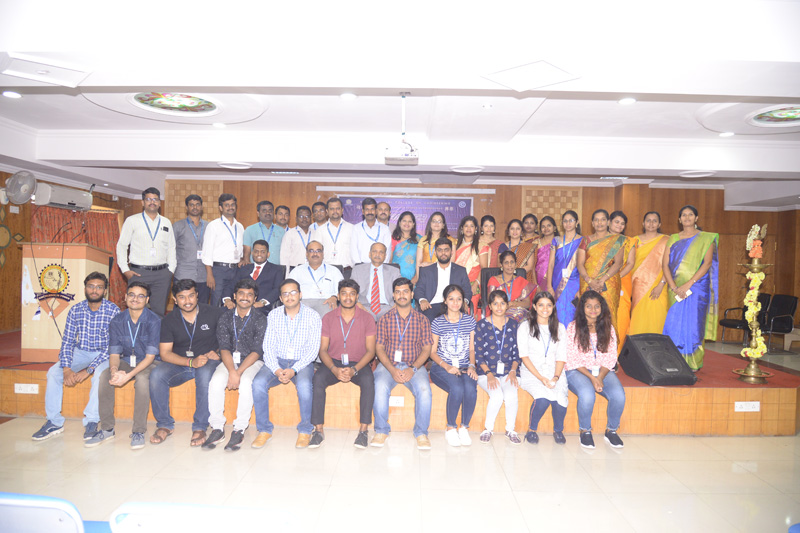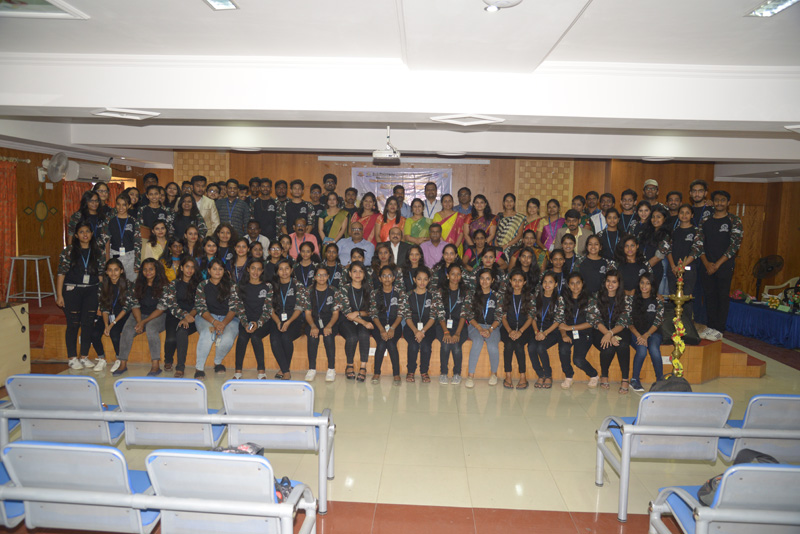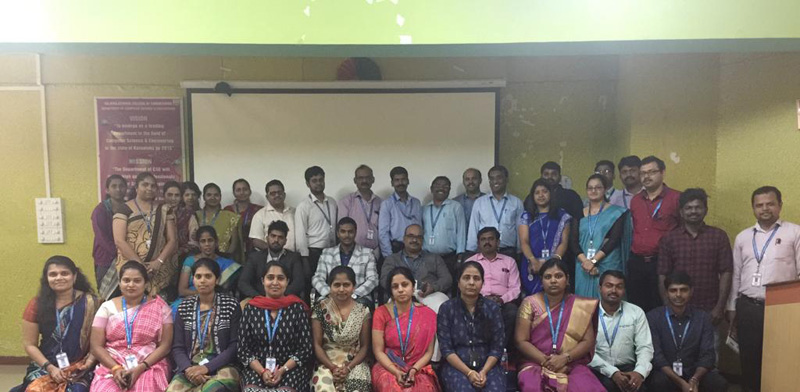Overview
Dept. of CSE was established in 2006 with an intake of 60. It has been raised to 120 in the year 2013-14 and now to 180 in the year 2015-16. CSE department is rich enough to organize and encourage Students, teaching & non-teaching staffs by conducting various events like workshops, Technical seminars, expert lectures, FDPs, industry visits and etc. Postgraduate for CSE was established in 2013 with a an intake of 18,which is affiliated to VTU and approved by All India Council for Technical Education(AICTE). The M.Tech programme in Computer Science and Engineering imparts a breadth of advanced knowledge in various areas of computer science. The programme is designed such that a student can complete it based on advanced coursework alone. However, the students are given the option to concentrate on a problem by substituting some of the courses with equivalent project work. CSE is also having well established Center Of excellence (CoE) in the field of IoT. Currently there is a prolonged growing market for professionals possessing a clear overview of current information and communication networks capabilities, standards and trends, along with a firm grasp of specifics in areas ranging from data network protocols to network security issues.
Today computer industry needs adaptable people who are equally at home presenting business solutions to senior management as finding the fault in a piece of code. This course is ideal for those who see their initial career in a wide-ranging role. Work should include IT consultancy, IT support, analyst, programmer, hardware engineer, network and system administrator etc.
Vision
To emanate as a prime source of technical education in the field of engineering.
Mission
The department of CSE will provide transformative education and research to create, contribute innovators and leaders for society and industry.
Course Name
Computer Science and Engineering
Duration
4+ years (UG), 2+ years (PG)
Eligibility
Marks - General
45% in Aggregate
Marks - SC / ST / OBC
40% in Aggregate
Eligibility - Subjects
- Physics & Mathematics along with Chemistry/ Bio technology/ Biology(UG)
- B.E. in Computer Science or Information Science (PG)
Eligibility - Exam
- A rank is must in Entrance Examinations like CET, KRLM, COMED –K, AIET, AIEEE Etc.
- A rank is must in PGCET etc.
Application Form
Application Not Available! Please contact the office!
A+ Accreditation, Approvals, and Recognition
- Approved by AICTE
- Affiliated to VTU
- Approved Research Center
Career Opportunities
Computer Science and engineering graduates are the pillars in the current and emerging information era. Opportunities include pursuing Master of Science programs in reputed Universities of U.S. and taking up research assignments in Hardware, System Software, Computer Engineering, Multimedia, and Net Working and Communications areas. The career opportunities for computer science graduates can be classified into seven categories: programming and software development, information systems operation and management, telecommunications and networking, computer science research, web and Internet, graphics and multimedia, training and support, and computer industry specialists. Some careers require additional formal training or study, and experience working in the field. For example, an MBA degree is helpful to management consultants, a course work in biology and biochemistry is needed for bioinformatics specialists, and an advanced degree in computer science is usually required for data miners.
Activities
Our Strength
Infrastructure
The Department has fully fledged laboratories with latest softwares and systems which supports the curriculum. To enable computer science and engineering students with best faculties to set an in depth practical understanding of their engineering the projects labs are designed. We have well equipped seminar halls, classrooms, departmental library and research center.
- DBMS / COMPUTER GRAPHICS LAB
- SS & CD /USP LAB
- R & D/DS LAB
- COMPUTER NETWORKS/ DAA LAB
- WEB PROGRAMMING / PROJECT LAB
- C LAB
- LOGIC DESIGN /EC/ MICRO PROCESSOR LAB
- MACHINE LEARNING LAB
Calendar of Events
Objectives
Programme Educational Objectives (PEO’s)
- PEO-1: Graduates of the program will possess strong educational foundation in mathematics, science, and computer science & engineering necessary for pursuing career and/ or higher studies in computing as well as other allied professions.
- PEO-2:Graduates with an interest in, and aptitude for lifelong learning will be engaged in learning, understanding, and applying new ideas and technologies as the field evolves to solve engineering problems, design appropriate computing systems that are technically sound economically viable and socially acceptable and be responsible engineering and computing professionals.
- PEO-3:Graduates will be informed leaders, effective communicators who work efficiently with diverse teams, promote and practice appropriate ethical moral and codes.
Programme Outcomes (Pos)
- PO1-Apply knowledge of mathematics and science, with fundamentals of Computer Science & Engineering to be able to solve complex engineering problems related to CSE.
- PO2-Apply mathematical foundations, algorithmic principles, and computer Science theory in the modelling and design of computer-based systems in a way that demonstrates comprehension of tradeoffs involved in design choices.
- PO3-Analyze a problem, and identify and define the computing requirements appropriate to its solution
- PO4-Design and development principles in the construction of software systems of varying complexity.
- PO5-Design, implement, and evaluate a software or a software/hardware system, component, or process to meet desired needs within realistic constraints such as memory, runtime efficiency, as well as appropriate constraints related to economic, environmental, social, political, ethical, health and safety, manufacturability, and sustainability considerations.
- PO6-Use the techniques, skills, and modern engineering tools necessary for practice as a CSE professional.
- PO7-Work effectively as an individual, and as a member or leader in diverse teams and in multidisciplinary environment.
- PO8-Demonstrate knowledge of contemporary issues and understand professional, ethical, legal, security and social issues and responsibilities.
- PO9-Analyze the local and global impact of computing on individuals, organizations, and society.
- PO10-Demonstrate knowledge and understanding of the engineering and management principles including financial implications and apply these to his/her work, as a member and leader in a team, and to manage project work as part of a multidisciplinary team.
- PO11-Communicate effectively in both verbal and written forms.
- PO12-Recognize the need for and be motivated to engage in life-long learning and continuing professional development.
Program Specific Outcomes (PSOs)
Engineering Graduates will be able to:
- PSO-1: Understand, apply, and demonstrate advanced technical skills in problem solving and leadership, as well as an understanding of system integration and the practical technological problems of end users.
- PSO-2:An ability to design, implement, and evaluate a software or a software/hardware system, component, or process to meet desired needs within realistic constraints such as memory, runtime efficiency, as well as other socio-economic constraints.
- Programming in C & Data Structures
- Discrete Mathematical Structures
- Data Structures and Applications
- Computer Organization
- Microprocessor & MicroControllers
- Data Communication
- Unix & Shell Programming
- Analog & Digital Electronics
- Automata Theory
- Computer Networks
- Java & J2EE
- Artificial Intelligence
- Software Testing
- Object Oriented Modelling & Design
- Software Architecture
- DataBase Management Systems
- System Programming
- Operating system
- Software Engineering
- Information Network Security
- AdHoc Networks
- Mobile Computing
- Computer Graphics
- Mobile Application Development
- Python Programming
- Storage area network
- Artificial intelligence and Machine learning
- Big data
- Internet of things
News & Events
- 12
- Apr
- 2025
ICRRCE-2025
International Conference on Recent Research in Computational Sciences and Engineering
- 21
- Mar
- 2025
Alumni Talk on “The Future of Digital Marketing: Trends and Innovations”
Rajarajeswari College of Engineering, Department of Computer Science & Engineering has organized Alumni Talk on "The Future of Digital Marketing: Trends and Innovations" on 21 March 2025
- 21
- Mar
- 2025
Seminar on “Need of Incubation Centres in HEIs”
Organized by Rajarajeswari College of Engineering, Department of Computer Science and Engineering & RRIIC
- 10
- Mar
- 2025
Webinar on “Information Security & Awareness Education”
Rajarajeswari College of Engineering website regarding an upcoming webinar organized by the Department of Computer Science and Engineering. Join us for an insightful session aimed at enhancing your understanding of Information Security—a must-know in today’s digital era! Learn how to safeguard your personal and professional digital footprints from cyber...
- 9
- Dec
- 2024
Talk on ‘Water Conservation and Waste Management’
Rajarajesvari College of Engineering organised an event on "Water Conservation and Waste Management" was held on 9th December 2024 at Dr. APJ Abdul Kalam Hall, RRCE, featuring Dr. D.C. Sharma as the resource person.
Syllabus
Faculty Publications
| Year | IJ | IC | NC | TOTAL |
|---|---|---|---|---|
| 2022-2023 | 42 | 06 | - | 48 |
| 2021-2022 | 82 | - | - | 82 |
| 2020-2021 | 56 | - | - | 56 |
| 2019-2020 | 19 | - | - | 19 |
| 2018-2019 | 73 | 01 | 06 | 80 |
| 2017-2018 | 06 | 20 | 02 | 28 |
| 2016-2017 | 32 | 6 | 46 | 84 |
| 2015-2016 | 40 | - | - | 40 |
| 2014–2015 | 34 | 30 | 22 | 86 |
| 2013–2014 | 6 | - | 19 | 25 |
| 2012–2013 | 3 | 1 | - | 4 |
| 2011–2012 | 7 | 12 | 32 | 51 |
| 2010–2011 | - | 1 | - | 1 |
| 2009-2010 | 4 | 3 | 5 | 12 |
| Total | 404 | 80 | 132 | 616 |
Placement Details
| Year | Total number of final year students(Eligible) |
Number of students placed |
|---|---|---|
| 2023 | 152 | 135 |
| 2022 | 134 | 104 |
| 2021 | 135 | 114 |
| 2020 | 131 | 103 |
| 2018-2019 | 93 | 46 |
| 2017-2018 | 81 | 65 |
| 2016-2017 | 82 | 65 |
| 2015-2016 | 53 | 50 |

















